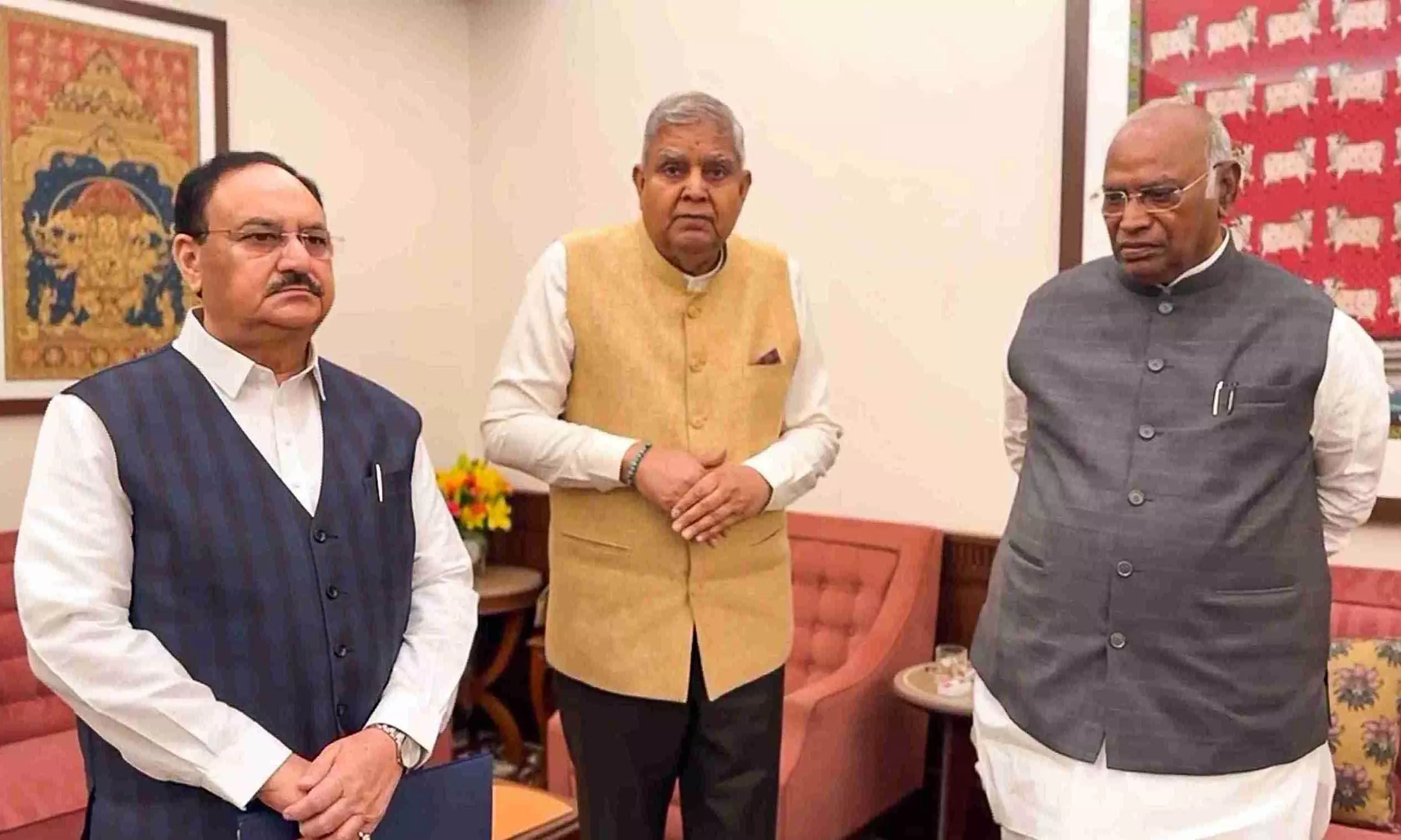
RS floor leaders to meet at 4.30 pm to discuss Justice Varma cash row
Recalling the NJAC Act, Dhankhar says the House needs to reflect on how that revolutionary legislation, emanating from Parliament, was struck down

Rajya Sabha Chairman Jagdeep Dhankhar has called a meeting of the leaders of various parties to decide on the course of action the Upper House should take on pleas by some MPs seeking a discussion on the alleged discovery of burnt cash from the official residence of a Delhi High Court judge.
The meeting is scheduled to take place at 4.30 om on Tuesday (March 25). “The issue is undoubtedly serious enough,” Dhankhar said in the House during the day.
Also read: 'Cash in storeroom not mine,' claims Justice Varma as SC shares probe details
Rejecting a Rule 267 notice submitted by Haris Beeran of the Kerala-based IUML, who wanted a discussion on the matter by setting aside the business of the day, Dhankhar informed the Rajya Sabha that he had a meeting with Leader of the House, JP Nadda, and Leader of Opposition Mallikarjun Kharge on Monday to discuss the issue of Justice Yashwant Varma.
According to him, Kharge suggested calling a meeting of floor leaders and Nadda agreed.
Dhankhar lauds CJI Khanna’s prompt action
Applauding the alacrity with which Chief Justice of India Sanjeev Khanna has already intervened in the issue, Dhankhar said he will hold further talks with floor leaders of all political parties at 4.30 pm to find a way out on how to have a structured discussion in the House on the “very critical issue that is agitating the minds in branches of governance”.
“The three of us took note of the developments and also took note that for the first time, in an unprecedented manner, the Chief Justice of India took the initiative to put everything in the public domain,” he said.
Dhankhar was referring to the apex court uploading on its website an in-house inquiry report, including photos and a video, into the alleged discovery of a huge stash of cash at Justice Varma’s official residence.
Also read: Who is Justice Yashwant Varma, the Delhi HC judge embroiled in cash-in-home row?
A fire at the storeroom of the official residence of Justice Varma on March 14 in the posh Lutyens’ Delhi locality purportedly led to the discovery of the cash by firefighters and police personnel.
CHI Khanna has constituted a three-member panel to probe the discovery of “four to five semi-burnt sacks” of Indian currency notes after the fire.
Stating that the legislature and the judiciary function optimally when they perform best in their respective realm, Dhankhar said the Supreme Court putting the entire material available with it in the public domain has found wide acceptance in the country.
NJAC Act back in focus
Recalling the National Judicial Appointments Commission (NJAC) Act, 2014, Dhankhar said the House needs to reflect on how that revolutionary legislation, emanating from Parliament, was struck down. He added that had that law been in force, the current situation may not have arisen.
The NJAC Act, 2014, established through the 99th Constitutional Amendment Act, aimed to replace the existing collegium system for selecting judges of the Supreme Court and High Courts with a broader, more transparent process, but it was struck down by the Supreme Court in 2015.
Also read: Cash discovery row: Judicial work withdrawn from Justice Yashwant Varma, says Delhi HC
Dhankhar also said it is time to evolve a mechanism that safeguards legislation emanating from Parliament from meeting a similar fate in the future (judicial review and/or scrapping of important laws). “We have to reflect whether we are at all relevant,” says Dhankhar.
A need for reflection
Dhankhar reminded the House that the law was passed by Rajya Sabha with near unanimity, with no dissension, only one abstention, and was later endorsed by the requisite 16 state assemblies and signed by the President under article 111 of the Constitution.
“Now, it is befitting the occasion to reiterate (that it) was a visionary step. And imagine if that had taken place, things would have been different. What emanated from the Indian Parliament as a historic development with rare convergence of unanimity since independence, found acceptance by needed state legislatures. We need to reflect on what happened to that,” he said.
Also read: Cash-discovery row: SC collegium confirms transfer of Justice Yashwant Varma
Dhankhar said under the Constitution, there is no provision that allows anyone to tinker with a Constitutional Amendment. While reiterating that one is considered innocent until proven guilty, he urged MPs to think about the “judicial mess”.
ONOE committee’s tenure extended in Lok Sabha
In the Lok Sabha, the tenure of the parliamentary committee scrutinising the two bills for One Nation One Election (ONOE) was extended till the first day of the last week of the Parliament’s Monsoon session.
The Joint Committee of Parliament’s Chairman PP Chaudhary moved the motion for the extension in the House, and it was passed with a voice vote.
The committee members are of the view that their work is likely to stretch for a long period of time as the seminal import of the proposed laws will require them to consult a wide range of stakeholders, including political parties and state governments.
Also read: Cash discovery: Allahabad HC lawyers on indefinite strike over transfer of Justice Varma
The Lok Sabha secretary general also informed the House that a new member from Rajya Sabha was being included in the panel. The 39-member committee had a vacancy following the resignation of YSR Congress MP V Vijayasai Reddy from the Rajya Sabha.
The ONOE committee was constituted in the last Winter Session and its term was to to end on the first day of the last week of the ongoing session.
(With agency inputs)

